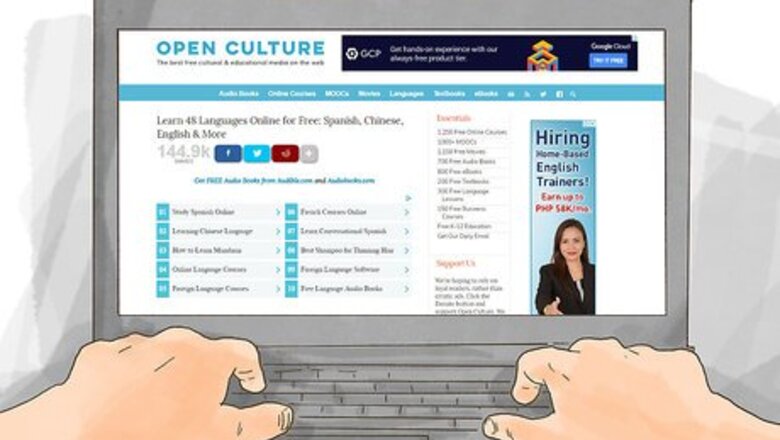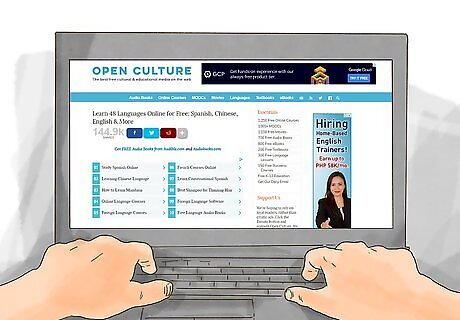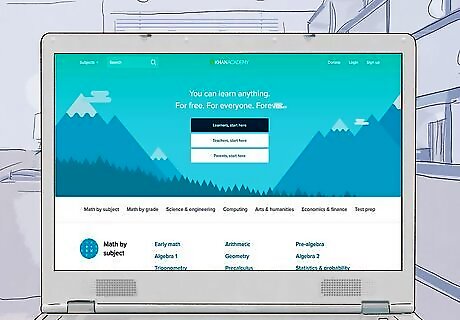
views
Learning a New Language

Enroll in an online language course. Some online educational resources offer basic language classes for free. Other websites, like universities, offer comprehensive language courses at a low price. Find a language course that best fits your need and begin studying to increase your comprehension. Most people learn best when hearing or speaking the language aloud. Supplement your language learning with audio clips, or practice your skills with a native speaker. Open Culture, Coursera, and EdX all offer free foreign language courses.

Find an online tutor. You may feel unsure how your skills are progressing if you're learning a language alone. By hiring a tutor, you can practice your language skills and receive comprehensive feedback. Depending on your needs, you can communicate with your tutor by email, phone, or video conference. Many tutors offer language classes at an affordable price. Choose a native speaker for your tutor if possible. They will be best at teaching you grammar, pronunciation, and conversational skills. Popular websites for finding language tutors include: [italki.com iTalki,] [tutor.com Tutor.com,] and [verbling.com Verbling.com.]

Turn to the internet for study resources. Online, you can access flashcards, practice sentences, and worksheets at little-to-no cost. You can also interact with other language learners via forums. Use study resources to further cement your knowledge of the language, especially if you're struggling in your online course. Video sharing sites, like [youtube.com YouTube] and [vimeo.com Vimeo,] also have language-learning tutorials and videos in foreign languages. Improve your language skills with apps. Language-learning apps can turn practice time into a fun and educational game. Popular language-learning apps include DuoLingo, Memrise, and Livemocha.

Listen to foreign music or watch foreign films for practice. Few activities are as beneficial for language-learning as listening to a native speaker. You may not be able to travel to your country of choice, but you can listen to native speakers. Watch a foreign film and analyze the language. Look up the lyrics to a foreign song beforehand and listen to it several times. With every repetition, you'll recognize more words. When watching a foreign movie, try one without subtitles. You may find yourself relying too much on the text instead of the audio.
Enrolling in Online Courses

Enroll in an independent study course. Email a local university to see if they offer independent study courses, where you learn at your own pace online. Most colleges will let you take their courses without applying for a program. Independent study can be a great option if you're too busy for scheduled classes. How much you learn in an independent study course is up to you. You will benefit the most from the course if you maintain strong motivation.

Check out online educational resources. Plenty of online resources offer free study materials in mathematics, sciences, humanities, and other subjects. An educational resource site might have practice exercises, videos, and other coursework to help you learn. You can use educational resources as a supplement to your courses or as a primary source of learning. Khan Academy is a volunteer-run nonprofit offering study guides for computer programming, math, science, history, economics, and other subjects. Their courses have been translated into dozens of languages, including English, Spanish, French, and Portuguese.

Take free business courses offered by the U.S. government. The Small Business Administration (SBA) was created by the United States government to advocate for and assist locally-owned businesses. To further their mission in building and growing small businesses, they offer free online business classes like "Understanding Your Customer," "Establishing Values for Your Business," and "Introduction to Pricing." You can access free courses through their online https://learn.sba.gov/dashboard Learning Center.]

Listen to free lecture series. Many respected universities (like Stanford, Yale, UC Berkeley, and Harvard) offer free online lecture series on a variety of subjects . Some courses even let you interact with the professor as you learn, though most will only include lecture links.

Try a MOOC (massive open online course). MOOCs offer educational courses to anyone who wants to learn, with no limit on class attendance or geographical location. Most MOOCs are structured similarly to university courses, though they don't usually offer academic credit. Through MOOCs, you can receive free distance learning at little-to-no cost. MOOC professors are usually established in their field and provide accurate, enriching content for students. One downside of MOOCs is that, because of the large class size, you don't typically get to interact with the professor. Messages or questions are usually addressed by other students, and grading is often automatic.
Accessing Books, Films, and Music

Expand your music horizons. Most any song you can think of is available online with the click of a button. Now's the time to explore new genres, or learn to appreciate one at a greater depth. If you've always wanted to know more about jazz or appreciate classical music, now is your chance. You can find free music on Freegal, the Free Music Archive, and NoiseTrade.

Check out films and documentaries. Thanks to the internet, you have an unlimited movie resource. Some may claim that movies cannot be educational, but watching the right film can be an enlightening experience. Watch classic movies, foreign films, and documentaries. Look for movies that increase your understanding of the world and challenge your current perspective. Although less movies are available in the public domain, you can watch many early films (like silent movies) for free. Public Domain Flix streams hundreds of movies released to the public domain.

Read books released in the public domain. Every year, new books are available to read for free once their copyright has expired. In most European countries and the United States, books are released into the public domain approximately 70 years after the author's death. After this point, you can read e-books at no cost. Project Gutenberg is a prominent volunteer effort to digitize books released into the public domain. They are an excellent source of free e-books. You can also purchase e-books, if you'd prefer to read contemporary novels. You can buy e-books through popular retailers like Amazon, Google Books, or Kobo Store.

Listen to audiobooks. Most books released into the public domain are available as a free audiobook. If you'd prefer a popular novel, you could purchase an audiobook instead. Audiobooks are a great way to absorb a novel when you're busy. If you work online, you can turn one on and enjoy the storyline while multi-tasking. Similar to Project Gutenberg, LibriVox is a volunteer organization that makes public domain audiobooks available for free. Audible is a popular online audiobook retailer that provides paid members with one or two audiobooks a month, depending on your subscription.
Researching Online

Use Wikipedia as a jumping-off point. Wikipedia is an online database which is constantly edited by authoritative users and hobbyists alike. Read its articles when beginning to research a subject. Look at the references or external links for additional information. Evaluate a Wikipedia article's veracity by looking at the number of cited sources, checking the page edit history, and doing further research to double-check. Although Wikipedia contains thoroughly-researched material, use it to gain basic knowledge. Do not cite Wikipedia in articles.

Focus on peer-reviewed articles. Peer-reviewed articles have been verified by experts as accurate and trustworthy before they were published. In most cases, the article is certified blindly, which means that it receives validation not on the author's reputation but on its own quality.

Search for authoritative sources. Clickbait sites, like Buzzfeed or Ranker, have entertaining but not necessarily accurate information. Beyond academic resources, government websites and national news services will have more credible content. Government sites will usually have ".gov" in the URL (like usa.gov, or gov.uk). When reading national news resources, make sure you are not reading opinion pieces or blogs. You can recognize a non-profit website by the domain ".org." While they can be reliable, some may still contain biases.

Access online research databases. Most academic fields have free databases available for researchers. These databases include articles, reviews, and other academically-valid sources. Popular free research sites include Google Scholar, OpenDOAR, and EThos. If you're enrolled in a university, you may be able to access usually-paid resources for free. Local library databases can also offer free databases.
















Comments
0 comment